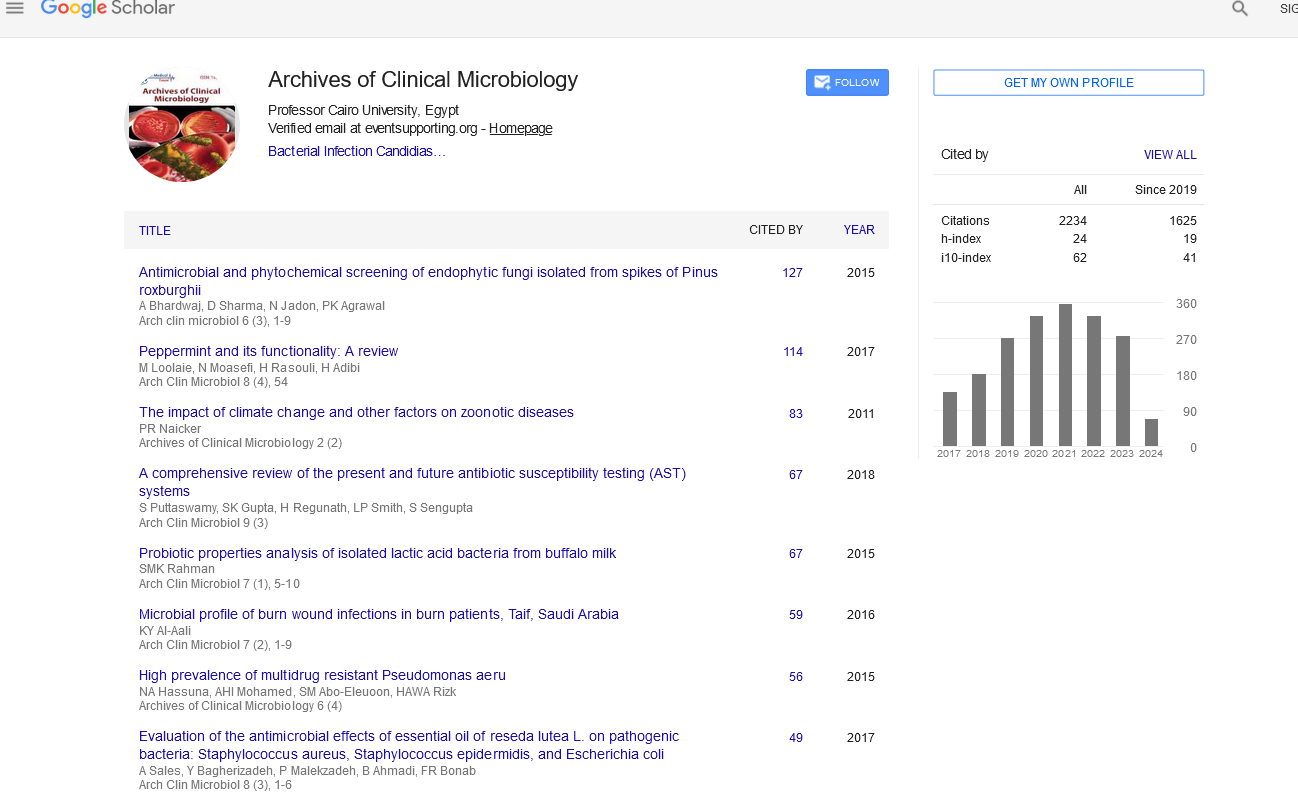Perspective - (2024) Volume 15, Issue 2
Exploring the Intricacies of Parasitology: Unveiling the Hidden World Within
Aysen Orman*
Department of Parasitology, Bahcesehir University, Istanbul, Turkey
*Correspondence:
Aysen Orman, Department of Parasitology, Bahcesehir University, Istanbul,
Turkey,
Email:
Received: 06-Feb-2024, Manuscript No. IPACM-24-14440;
Editor assigned: 09-Feb-2024, Pre QC No. IPACM-24-14440 (PQ);
Reviewed: 23-Feb-2024, QC No. IPACM-24-14440;
Revised: 06-Mar-2024, Manuscript No. IPACM-24-14440 (R);
Published:
13-Mar-2024
Introduction
Parasitology is a captivating branch of biology that delves into
the intricate relationships between parasites and their hosts,
unlocking the mysteries of a hidden world within the natural
realm. This discipline not only unveils the fascinating diversity of
parasites but also sheds light on their impact on ecosystems,
human health, and the delicate balance of nature.
Description
Understanding parasitology
At its core, parasitology is the scientific study of parasites,
organisms that live in or on a host organism and derive nutrients
at the host's expense. These organisms come in various forms,
ranging from microscopic protozoa to complex multicellular
helminthes. The study of parasitology encompasses a broad
spectrum, including the life cycles, adaptations, and interactions
between parasites and their hosts.
Classification of parasites
Parasites are classified into different categories based on their
characteristics and the nature of their interactions with hosts.
Protozoa, for example, are single celled organisms that often
cause diseases in humans and animals. Helminths, on the other
hand, include parasitic worms such as nematodes and
trematodes. Understanding the classification helps researchers
comprehend the specific challenges posed by different types of
parasites.
Life cycles and adaptations
Parasites have evolved diverse life cycles and adaptations to
ensure their survival in various environments. Some parasites
exhibit complex life cycles involving multiple host species, while
others have developed intricate mechanisms to evade the host's
immune system. The study of these life cycles and adaptations
provides valuable insights into the strategies parasites employ to
thrive in their respective ecosystems.
Host parasite interactions
The relationship between a parasite and its host is a dynamic
interplay of coexistence, competition, and adaptation.
Parasites have evolved mechanisms to manipulate host behavior,
evade immune responses, and establish long term infections.
Researchers in parasitology aim to unravel the complex web of
interactions between hosts and parasites, understanding the
molecular and physiological processes involved.
Impact on ecosystems
Parasitology extends beyond individual organisms to explore
the broader ecological implications of parasitic interactions.
Parasites play crucial roles in shaping ecosystems by influencing
population dynamics, community structure and even ecosystem
stability. Understanding these ecological impacts is essential for
preserving biodiversity and maintaining the delicate balance of
natural ecosystems.
Human health and parasitic diseases
In the realm of human health, parasitology plays a pivotal role
in combating parasitic diseases that affect millions of people
worldwide. Malaria, caused by the Plasmodium parasite and
schistosomiasis, caused by parasitic worms is just a few examples
of diseases that have profound socio-economic impacts. Advances
in parasitology contribute to the development of effective
diagnostic tools, treatment strategies and preventive measures to
combat these diseases.
Research frontiers in parasitology
As technology advances, new avenues for research in
parasitology emerge. Genomic studies, molecular techniques
and imaging technologies enable researchers to delve deeper
into the intricacies of parasitic organisms. The exploration of
host parasite interactions at the molecular level opens up
possibilities for targeted therapies and the development of novel
interventions.
Conclusion
Parasitology is a multifaceted field that continues to unravel
the mysteries of the hidden world within. From the microscopic
world of protozoa to the intricate life cycles of helminths, the
study of parasites offers a unique perspective on the
complexities of nature. As researchers delve deeper into the
intricacies of parasitology, they not only contribute to scientific
knowledge but also pave the way for advancements in human
health, ecology and our understanding of the delicate balance
that sustains life on earth.
Citation: Orman A (2024) Exploring the Intricacies of Parasitology: Unveiling the Hidden World Within. Arch Clinic Microbio Vol:15 No:2





